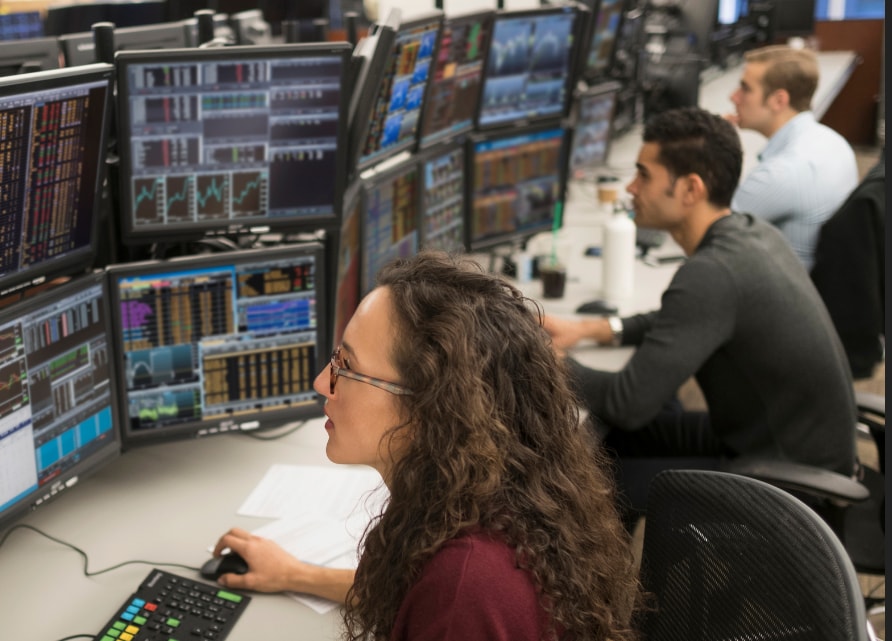Stock markets in Europe are set to finish the session in the red.
The major indices started off lower due to the sell offs seen in Asia and the US. The downward pressure on equities picked up when the Fed announced they would not be extending the supplementary leverage ratio (SLR) – a mechanism that requires US banks to hold fewer capital reserves so they could free up cash to inject into the economy in the form of loans. Traders reacted by selling stocks as they took the view that if banks are more restricted in terms of capital requirements, that is likely to hold back the recovery somewhat.
JD Wetherspoon shares are holding up well considering its dreadful first half update. Sales in the six month period tumbled by nearly 54%, the loss was almost £21 million, which was a big difference from the £76.6 million profit posted last year. No interim dividend was declared on account of the group enduring such a harsh environment – the lockdowns have hit the pub chain hard. On the bright side, it has managed to hunker down through the restrictive period and it has access to £1.1 billion in lending facilities, so there shouldn’t be any problems on the financing front. In the months ahead, the restrictions should be relaxed and that should be a great boost to the pub chain. Traders were not shocked by today’s figures. As long as the UK keeps moving towards easing restrictions, the stock price is likely to remain in the uptrend that has been in place since November.
US
Wall Street has a mixed reaction to the news the SLR will be allowed to expire at the end of the month, rather than being extended. The NASDAQ 100 is up over 0.5% after having a choppy start to the trading session while the Dow Jones in slightly in the red. Lately, tech stocks have been at the forefront of any sell offs but now it seems the bargain hunters have moved to snap of relatively cheap stocks. The move by the Fed with respect to the SLR has put pressure on US banks, JPMorgan Chase and Wells Fargo are down over 2%.
FedEx shares are up 6% thanks to the strong third quarter update that was announced last night. Online shopping was already an increasing part of consumer activity but the lockdown took it to another level, and FedEx caught an uplift in business. Revenue for the three month period increased by 23% on an annual basis to $21.51 billion, ahead of forecasts. Equity analysts were expecting EPS to be $3.23 and the group delivered $3.47. The big freeze that hit southern US states disrupted some aspects of the business. It is believed the adverse weather knocked $350 million off of operating income. The bad weather has since passed, the company issued a bullish outlook as it expects that e-commerce and international express solutions will continue to see high demand for the foreseeable future.
Nike shares are a little lower as the revenue metric of the third quarter update disappointed. Revenue fell fractionally to $10.36 billion, missing the $11.02 billion consensus estimate. Shipment delays in North America caused revenue in the region to fall by 10% - impacting the group figure. It wasn’t all bad news as EPS was 90 cents, beating the 76 cents that analysts had predicted. China has become a very important market for Nike seeing as it is the second largest economy in the world. Sales in the region rose by over 50%. Online sales in Europe, the Middle East and Africa jumped by 60% so that helped offset the revenue lost out to store closures on account of restrictions.
FX
The US dollar index has shaken off its earlier loss and it is now up over 0.2% on the session. Once again, the US 10-year yield is dragging the dollar higher. The Fed’s decision not to extend the SLR could be construed as a form of tightening, as it suggests the financial system is now strong enough that it doesn’t need extra assistance. In the near-term, the could cause banks to curtail their lending activity, but ultimately it is a step in the right direction with respect to getting the banking system to be less dependent on lax capital requirements. The dollar hit its highest mark in over one week, hence why EUR/USD and GBP/USD are in the red.
Commodities
Gold is up despite the move higher in the US dollar, lately the inverse relationship between the two assets has been strong so ordinarily, you would expect the metal to be in the red, rather than up on the session. It is possible that some traders are buying into gold due to the mild risk-off sentiment running through the markets. Last week, the yellow metal rebounded from a nine month low but it seems the recovery is running out of steam. If the dollar continues on its recent uptrend, that could push gold back to its recent lows.
Oil is higher this afternoon as it has recouped some of the ground it lost yesterday – it dropped 7%. Today’s upward move seems to be fuelled by bargain hunting, the gains made are relatively small, which suggests that dealers are not overly confident in the market. Major European economies like Germany and France announced they will resume distributing the AstraZeneca-Oxford vaccine but there are fresh worries about rising Covid-19 case numbers in Europe so that is impacting demand perceptions.






